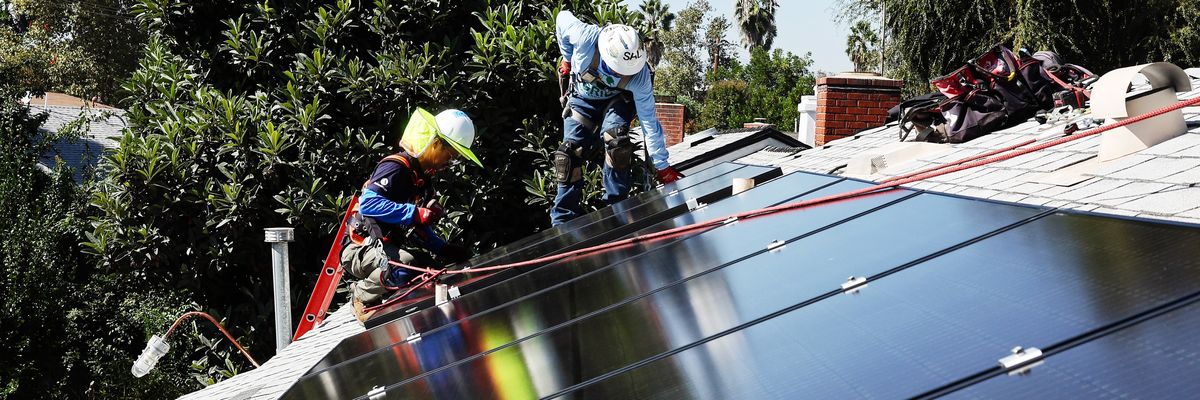More than $4 billion in new funding for the Inflation Reduction Act's anti-pollution grants will help to "deliver a better, cleaner future for America," said one climate action coalition on Monday as the U.S. Environmental Protection Agency announced that it would fund 25 new renewable energy and other projects across the country.
The agency unveiled $4.3 billion in new spending, the result of nearly 300 applications that were submitted by state, local, and tribal governments for the Climate Pollution Reduction Grants (CPRG) included in the IRA—President Joe Biden's $396 billion infrastructure and climate bill passed in 2022.
The 25 applications that were chosen for this round of grants came from 13 states and state coalitions, 11 cities and towns, and one native tribe.
The EPA said the grants could reduce greenhouse gas emissions by as much as 971 million metric tons by 2050, roughly equivalent to the emission of 5 million homes.
The climate action group Evergreen Action noted that during negotiations over the IRA, it championed the CPRG program because it recognizes that "states, tribal nations, and local governments have a central role to play in America's clean energy transition."
"Thoughtfully implemented, these grants will help alleviate pollution and health risks for millions of overburdened and underserved people in our region."
The implementation funding announced by the EPA will turn plans for a renewable energy expansion "into a reality" for cities and states across the country, said Rachel Patterson, Evergreen Action state policy adviser.
"We appreciate the EPA team for ensuring that this program will deliver new reductions in climate pollution alongside tangible benefits for communities across the country," said Patterson. "Let's get to work."
The funding that will be distributed by the EPA in the early fall, said EPA Administrator Michael Regan, includes:
- $450 million for the New England Heat Pump Accelerator in Connecticut, Maine, Massachusetts, and Rhode Island, speeding up the adoption of cold-climate air-source heat pumps, heat pump water heaters, and ground source heat pumps in more than 500,000 residential buildings;
- $248.9 million for the Clean Corridor Coalition in New Jersey, Delaware, Connecticut, and Maryland, to build electric vehicle charging stations for commercial trucks on Interstate 95;
- $430.2 million to advance building and industry decarbonization, freight electrification, climate-smart agriculture, and renewable energy deployment in Illinois, which aims to achieve 100% carbon-free power by 2045;
- $396 for the Reducing Industrial Sector Emissions in Pennsylvania (RISE PA) program; and
- $307 million to reduce agricultural waste and improve energy efficiency in homes and buildings in Nebraska.
The Native tribe that will receive funding is the Nez Percé Tribe, which submitted an application for funds to retrofit homes.
The U.S. Climate Alliance, a bipartisan coalition of governors who represent 55% of the U.S. population and 60% of the nation's economy, said it had collectively secured approximately $2.6 billion of the newly announced grants, providing "direct funding to 14 alliance states to implement ambitious measures that deliver significant reductions in greenhouse gas emissions and substantial community benefits."
Casey Katims, executive director of the alliance, said the coalition's members "are home to many of the world's most impactful climate solutions."
"With this huge new injection of federal funding, leading states will turn their innovative plans into bold action," said Katims.
The Southern Environmental Law Center (SELC) applauded the funding awarded to southern states including Virginia, which is set to receive nearly $100 million to improve air quality in underserved communities by controlling methane pollution from current and former coal mines and landfills, and South Carolina, where cities will receive $8 million to deploy municipal solar power and "smart surface" projects to reduce extreme heat and flooding.
"EPA created an unprecedented opportunity for state and local leaders to take climate action in the south," said SELC climate initiative leader Alys Campaigne. "Thoughtfully implemented, these grants will help alleviate pollution and health risks for millions of overburdened and underserved people in our region."
